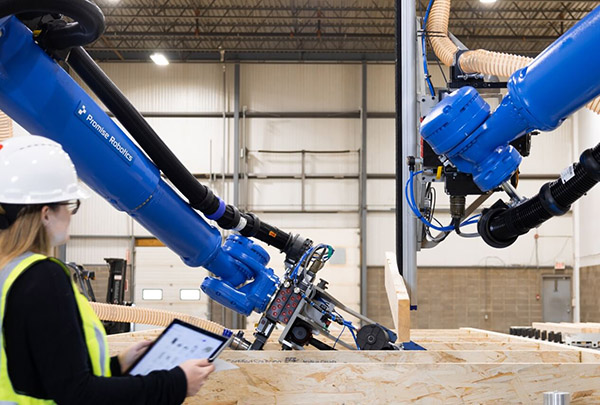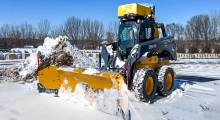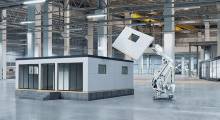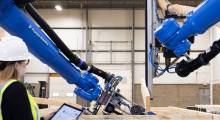Promise Robotics, which is developing a industrial production platform for robotic construction and assembly, today announced that it has raised $15 million in Series A funding, bringing its total funding raised to date to $25 million. The Toronto-based company's stated mission is to enable the construction industry to harness automation to build more affordable and sustainable homes.
Promise Robotics said it plans to use the funding to commercialize its platform and to continue expanding its intellectual property in artificial intelligence, computer vision, and robotic systems. The company claimed in a release that its proprietary, cloud-based software can manage the entire production lifecycle, from robotic planning to factory-floor operations.
“Builders are reluctant to invest in costly factories and then endure years of trial and error to achieve operational success,” observed Ramtin Attar, CEO and co-founder of Promise Robotics.
“These capital and knowledge barriers have historically impeded the industry's ability to invest in automation,” he said. “We have melded our first-hand expertise in automated homebuilding with transformative technology innovations to remove both barriers to broader adoption.”
Promise Robotics offers 'automation at scale' for housing, construction
The construction and housing development industries in the U.S. and Canada face persistent supply and labor shortages while grappling with a 10.7 million home deficit, according to the National Low Income Housing Coalition and the Canada Mortgage and Housing Corporation. To bridge this gap, new home building rates would need to triple, said Promise Robotics.
However, adding housing supply with outdated technologies runs counter to greenhouse gas (GHG) emission-reduction targets, since buildings are responsible for 38% of global GHG emissions, the company said.
Attar and Reza Nasseri, a former research and development executive at Autodesk and a Canadian homebuilder, founded Promise Robotics less than three years ago. They said they have extensive large-scale automation experience, having successfully completed thousands of homes in a high-volume prefab factory out of Alberta, Canada.
Promise Robotics said its AI-driven system enables the homebuilding industry to deploy automation at scale. By managing automation within factories as a service, the company said it can free customers to focus on building homes and growing their businesses.
It added that it can significantly increase the speed of sustainable assembly, from custom, single-family homes to multi-story buildings. Promise Robotics asserted that its platform “turns off-the-shelf industrial robots [such as those from KUKA] into ready-to-deploy production systems.”
Promise Robotics added that it “aims to remove the risk for homebuilders by offering products that benefit from a decade of operational excellence, continuous improvement, and successful homebuilding.” The company estimated that for every 1 million new homes, it can help the industry save $130 billion in cost, reduce GHG emissions by 560 metric tons, and generate 16,000 new categories of jobs.
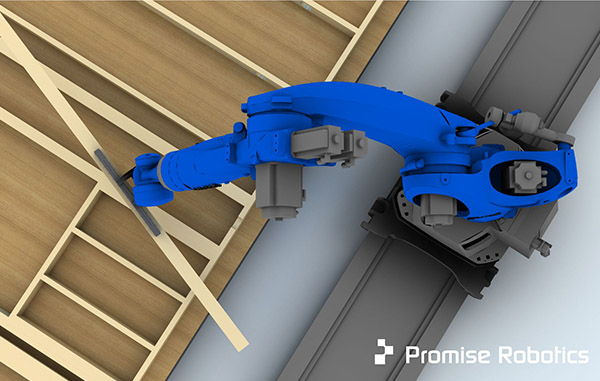
Investment to lead to more production
Horizons Ventures led Promise Robotics' Series A round, with participation from Radical Ventures and PSP Investments. Strategic investors included the United Brotherhood of Carpenters, Relay Ventures, and Alate Partners.
“It’s hard to imagine we will be building homes the same way in five to 10 years,” said Kerry Liu, an investor at Horizons Ventures. “Promise Robotics is well-positioned to be a disruptive force in this industry.”
“We studied the landscape and concluded that Promise Robotics was not only a technical leader, they had an immediate eye towards working with the home builder and rapid commercialization,” he added. “This is not surprising, given the background of the founders.”
The global market for construction automation could experience a compound annual growth rate (CAGR) of 16.3%, expanding from $227.2 million in 2021 to $562.5 million by 2027, predicted 360 MarketUpdates. Neurject and Markets and Markets said that market could grow from $420 million in 2021 to $765 million by 2026 because of labor shortages, sustainability goals, and more integrated AI.
“We’re seeing incredible momentum as the team at Promise Robotics successfully deploys AI systems to automate home construction and to bring efficiencies to an industry struggling to maintain productivity,” said Salim Teja, a partner at Radical Ventures. “Promise Robotics is now poised to transform how buildings get made, creating a more sustainable and affordable built environment.”
Promise Robotics said it has expanded its headcount by 200% in four months, and it is setting up its robotic production line in a micro-factory in Alberta, Canada, to kickstart its partnership with several homebuilders. The company is planning to make its system more widely available to North American homebuilders in 2025.
Article topics
Email Sign Up

